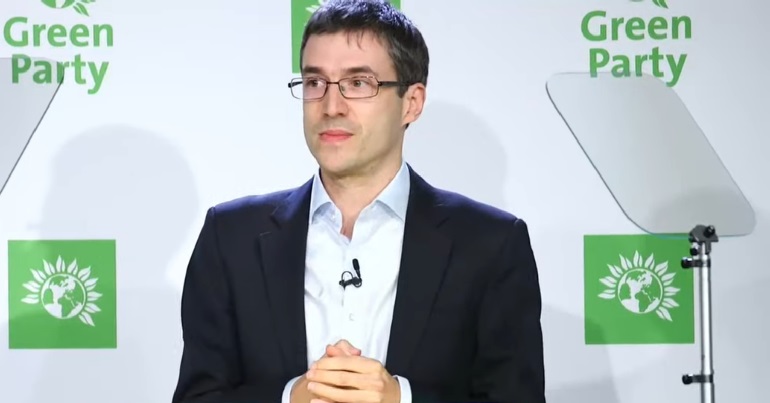Keir Starmer’s pledge to ‘end factionalism’ would take Labour back to vapid personality politics

Keir Starmer’s campaign to be Leader of the Labour Party has so far pitched left narratively, hamming up his history of supporting unions and social movements as a lawyer. The former Director of Public Prosecutions has also made a point of “ending factionalism” in the party. He says the details of what exactly this means will come in due course, but in the meantime party members should be worried this signals a return to the personality politics and authoritarianism of Blairism.
Factions in any organisation are groupings of people around a shared interest – in political parties this may be ideology, strategy or policy. They span the political spectrum. In recent times, Momentum has been the highest profile faction in Labour organising members broadly supportive of Jeremy Corbyn’s leadership and left-wing policies. Other active Labour factions include Open Labour (the “soft-left”), Campaign for Labour Party Democracy (CLPD), Labour First (the “old right”) and Progress (Blairites). Sometimes Labour’s affiliated trade unions also organise factionally to advance their own interests.
In practice, Labour party factionalism in recent years has tended to focus on organising around internal elections. Factions will endorse slates of candidates for internal party positions as a way of advancing their interests from positions of influence.
For example, National Executive Committee (NEC) is the governing body of the party. Ordinary members elect representatives to the NEC to set the strategic direction of the party, form policy and oversee procedure (e.g. the timetable for the current leadership elections). In recent years Momentum and CLPD have put forward joint slates which members which members have overwhelmingly voted for. Labour First and Progress have allied to do the same with less success. This has effectively ensured the dominant faction in the party (aligned with Corbyn’s leadership) is represented in key strategic decisions.
Factions also support candidates in local constituency party elections and selections for candidates for public office (i.e. MP, local councillor and Mayoral candidates). Factional endorsements effectively indicate to supporters the real politics of the person they’re voting for, beyond the superficial buzzwords offered during a hustings. This type of organising has been crucial to making MPs and city councillors more representative of the politics of Labour’s growing membership since 2015.
So if we understand “factionalism” as members actively organising within an internal democracy, what does Keir Starmer really mean when he says he wants to “end” it? Presumably the first step would be banning the organisational vehicles for factionalism. Momentum, CLPD, Open Labour, Progress and Labour First would be proscribed. Cutting off its nose to spite its face, a practical consequence of this would be losing significant mobilising infrastructure (particularly from Momentum) that has turned out thousands to campaign during elections in recent years.
With factional organisations proscribed, how would Starmer effectively ban slates for internal elections? Would any candidate organised as part of a slate or endorsed by a faction be disqualified? Presumably internal elections would become bland lists of people and their personal achievements.
Would Starmer ban groupings of MPs within the Parliamentary Labour Party (PLP)? The long-standing Socialist Campaign Group has been a haven for left-wing MPs. Tom Watson’s Future Britain Group was prior to the General Election composed of over 80 MPs. Would the groupings be banned or would they just not be allowed to organise, which would defeat their point?
The reality here is that Starmer’s attempt at a conciliatory soundbite is in fact unrealistic, unworkable and disadvantageous for every wing of the party. Starmer reveals a contempt for party members endemic in the PLP and the superficiality of his own analysis of what’s wrong in Labour and what we need to do to win. This is the platitude of a career politician who has never had to organise around anything. He’s a personality for personalities sake – never working collectively to advance a shared political aim, vision or strategy – only promoting himself.
Any practical application of his soundbite is necessarily authoritarian, returning to the repression of democracy and member activity as instigated by Tony Blair as he turned National Conference into a glorified rally and deprived members of any involvement in policy formation.
Its true that Labour needs a leader capable of holding our together our broad coalition of politics and interests. But unity should be achieved by stewarding a comprehensive party democracy where open political organising is encouraged and not driven underground. We do not need a leader to close ranks and take us back to optical personality politics that will turn off voters and internal authoritarianism that will alienate members. That approach would send Labour the way of other European social democratic parties: annihilation.




Think the broad church of views Labour and Tory Parties constantly trotted out is in reality a wide range of views that is dominated by those at the top of their hierarchy, ie it might be a broad church but the current pope decides the policies behind closed doors. We want PR when probably both Labour and the Torys would split and the parties would much more closely represent their voters
The Labour party is to progressive politics what VHS is to home entertainment – a dead format.
Watching Labour’s various apparachniks and commentariat kvetch (see what I did there?) about the way forward is analogous to the attending meetings where the people who manufactured VHS cassettes argue over whether they should be moulded from different coloured plastics or contain thinner tape that might make for longer recording times.
Even the idea that a broad church is a thing is historical dust – an analogy that has become essentially meaningless, because people’s understanding of how churches operate has long ago tipped the threshold such that its meaning is reduced to a hollow saying.
Labour are done with. It’ll be quicker for progressive politics to build up the Greens to replace the Labour party than for the Labour party to wise up and modernise itself. It’s in a death spiral. It doesn’t even understand who its supporters really are and why they support Labour. The people in the cities and university towns who still vote Labour aren’t coal hewers who have to rent their safety helmet and lamp from the pit owners. As soon as they see the sense of voting Green instead of Labour, especially as soon as they see the hope of a Green victory, Labour will be done with.
Which is not to say that Jeremy Corbyn is actually wrong about anything. Whether he is or not is entirely irrelevant.
Maybe VHS could have been endlessly improved and made backwardly compatible. But it wasn’t, and now it’s done.
Progressives should shore up the Green party. Every day that goes by will see the weather on our side.
Leave Labour to argue among themselves and for their arguments to be increasingly obscure and introspective. How many angels can dance on the head of a pit?
Leave Labour to re-write its history and pore over its many historical mistakes.
Leave Labour for dead.
Because we are in danger and need to act immediately to survive.
Join the Green party.
The focus and approach that the Green Party has, you really ought to look into. It is dismissed as unelectable and yet the movement is growing steadily in this country despite vitriol by both Left and Right. That means Green Party policy is probably pretty much right and challenging. Attractive characteristics?
The point of a Labour vote in December’s election was to keep the Tories. Pointless as it turned out, and is just inappropriate now. A pragmatic politics is required in the light of CC adaptions and economic revisions needed. The Green New Deal came out of the Green Movement and has been watered down by Labour. With your political interests Chris, I hope you would contrast and compare in detail.
A less than objective post, I find. The analysis of Socialism’s place and trajectory in European and UK politics which you touched on at the end of your piece, would be much more welcomed, so that Keir Starmer’s stance might be understood. The Socialist movement, whilst a broad-church is still a church, a philosophy based on fairness/ in the job sector. The job sector has changed so much and enterprise now dominates. I don’t condone Thatchers approach to enterprise’s introduction, but it is there now. So there are two things that undermine the church of socialism’s success. That Enterprise has dominance politically and will be the means to accomplish plans. And, that climate change is what will need to be adapted to and planned for, and that will take enterprise.
The secondary thought is that social-justice can function perfectly well without the philosophy of Socialism, and perhaps that is why Socialism is becoming less important across Europe. It no longer seems to have a function of balancing left and right in a competitive politics. Cooperation amongst philosophies is the trend in Europe and somehow has managed to avoid catastrophic continental war for a healthy period. The church of Socialism has been outstripped by the church of Enterprise, and we need a very good reason to make us go back to it.
I’m wondering if this post is not itself unnecesseraly pointed, in the way of a particular interpretation of his position.
It might easily be more sympathetically read, as a welcome wariness about about the extremes of factionalism ?
In which case more be welcome ?- pace more definition needed…..